Imagine pulling into your driveway and finding not one but two Catholic pilgrims in your yard. They lay in the grass, the two of them — man and wife — eating olives and lentils and gaily shouting “Ave, Ave, Ave Maria” as you pull into the driveway. What else could one do but let a smile rise on both cheeks and usher them inside, directly to the guest room, exhorting them to stay as long as they like?
These were old friends — or, at least, the sorts of friends who’ve always felt old to me, as if we grew up together. For the nature of our connection has been completely spiritual; I met Michael and his wife Emily at the Greek Orthodox Church in New Orleans over two years ago. There, as the coffee flowed and the baklava made the rounds, we happened to all be sitting with the Priest after Liturgy; incense still wafting about the place, its smell baked into everyone’s garments and mixing with the vapors of hot fresh coffee. To have so recently been in the presence of Christ, as He arrives before us in the flesh at each litrugical celebration is to gently loll into a special jolliness — a holy Sunday jolliness — the likes of which is not known to the nonreligious, and it would come to permeate all of our Sundays together in the splendidly romantic and very Catholic city of New Orleans.
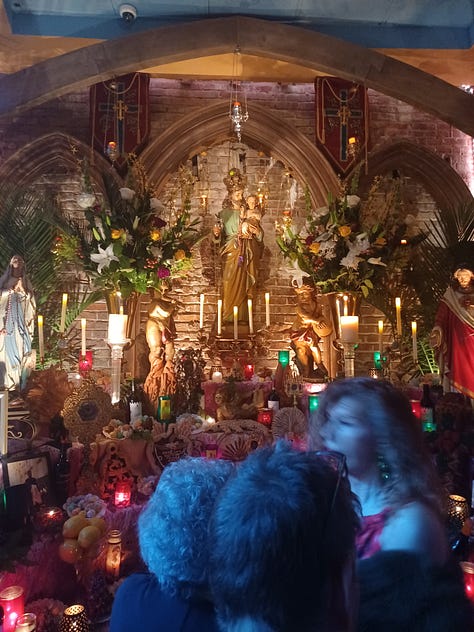

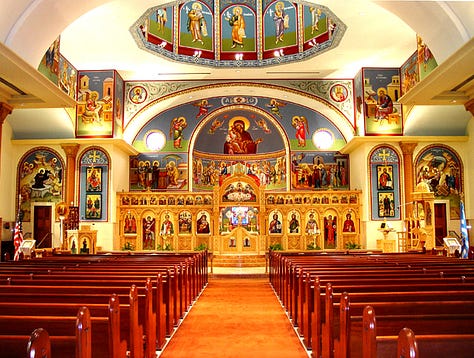
There was something strange about these two to me then. The briefest glance at the both of them did not lead one to think they were especially religious folk — Michael’s long flowing hair, his tattered cardigan and floppy workman’s cap, and the both of them with stylish, simple notebooks full of poems. They smelled like cumin, ate lentils constantly, and seemed somehow versed in the vernacular of leftish hipsters — yet at once deliberately and quietly removed from “all those earthly concerns”. Religious hippies, I reckoned them to be, and I was glad to be burning my mouth on Sunday morning styrofoam-cup coffee alongside them both as we spoke with the Priest. And again and again I saw them in this fashion, noting only one genuinely strange — even vaguely distressing — fact about them: They never seemed to be at Liturgy on Sundays.
Then, I was a Catechumen in the Greek Orthodox Church. After a brutal “quarantine” experience at a military facility in California involving extended bouts of what amounted to solitary confinement, I began to pray. And what started as little prayers borne of desperation blossomed into a full-blown desire to seek God — and up to then, I had found Him exclusively in the Eastern Orthodox Churches. When I got stationed in California, I began to attend Liturgy at Holy Trinity by the lakeshore, and was steadily on my way to becoming a full-fledged convert to the Eastern Church as I found her there. Full of zeal, as converts tend to be, I finally confronted Michael about his and Emily’s persistent absence from Sunday Liturgies.
“My friend, we are Catholic” — he said the world “Catholic” very slowly and romantically. “We are obligated to attend Sunday Mass at a Catholic Church, and so we go to Saint Patrick’s on Camp Street.”
I was flummoxed. Catholic? I thought these guys were cool — I thought they were Orthodox! It had never occurred to me that any thoughtful young person would ever consider being seriously Catholic, much less — like Emily — a convert to Catholicism. I myself had been raised staunchly Catholic, and I knew well enough all of the ways in which the Masses of my youth felt utterly stale and devoid of spiritual content as compared with the mystic liturgical richness of Eastern Christianity and its exotic flavors. And, being a zealous would-be convert, I nearly jumped on him, saying that I had grown up Catholic but knew that Orthodoxy was true.
And again, in the charming and earnest manner of the poet-pilgrim that Michael is, he simply said — “Ah, my friend! You do know that Catholics have Orthodoxy too, don’t you?”
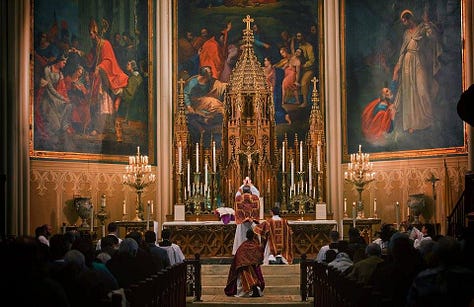
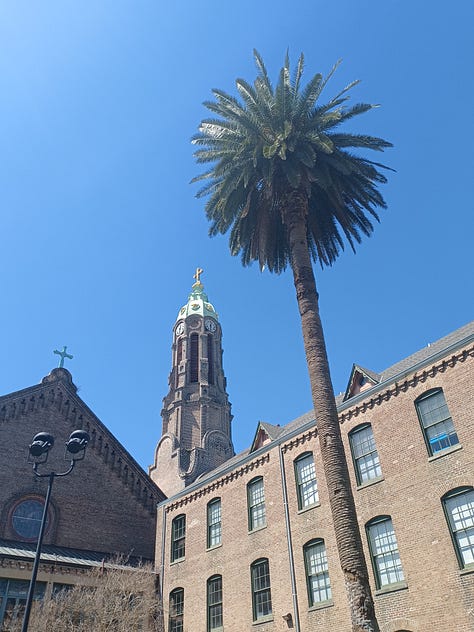
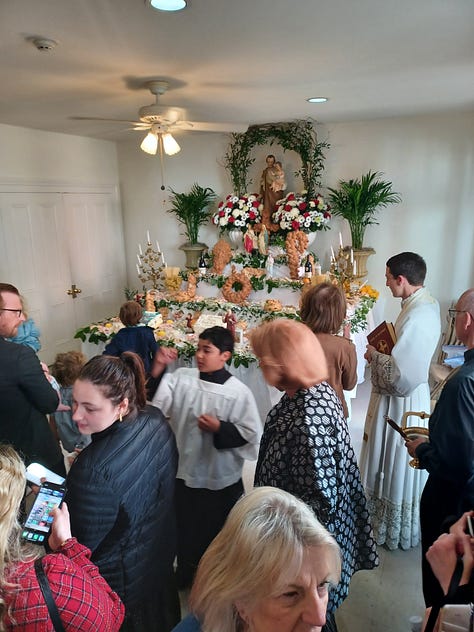
Within months, I was a regular Parishioner at Saint Patrick’s Traditional Latin Mass in New Orleans. Perhaps one day I will write more extensively about those months and the immense fruit they bore. But suffice it to say here that I credit Michael and Emily with leading me home to the Roman Catholic Church — and as such, to find such honored guests lazing about in my own yard was a true delight.
We discoursed, as men do, and perhaps in the manner that a particular sort of man does — a romantic man. For the word “romantic” contains the seed of our faith — Roman. We knew and continue to know that the very essence of romance as it is conceived in Western Civilization has its very heart and taperoot seated deeply within the rapturous beauty that Christian Rome has built both in the cities of her kingdoms and indeed in the hearts of men in every nation. And so in discoursing, we are really discoursing, you know? We are lazily drawling quips and aphorisms, we are turning the pages of old volumes and reading them aloud, sipping tea, dining intermittently, and even retreating into the forest in the afternoons, tackling the things of the heart and spirit together as mirthful compatriots are wont to do. At such times, one sheds the onerous thread that connects the living man to the wretched age he lives in, and he can find respite in a certain timelessness and gaiety of the mind — and for one week, we did this at my estate.
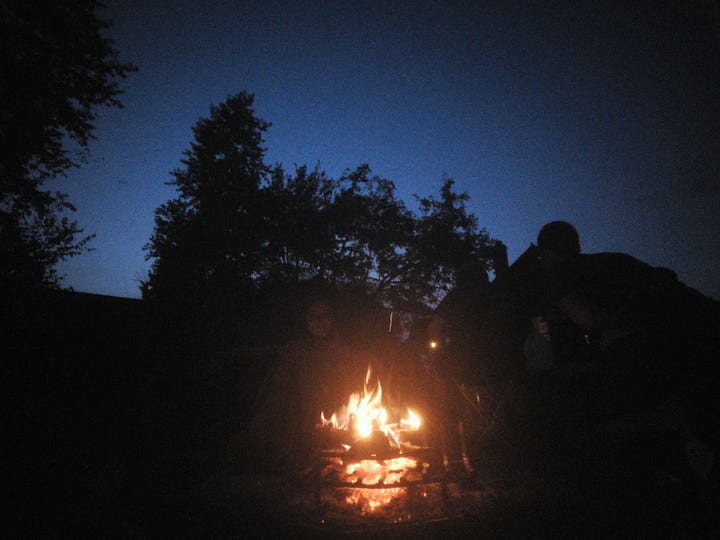

All of this is simple background for a statement Michael made in those discourses that, weeks later, continues to weigh upon my mind with immense gravity. Not only a poet but a pilgrim, too, Michael has traveled for many years of his life and is intimately familiar with the way of the vagabond, as I am. Older than I, on such topics as tramping and penniless traveling he feels to be a rare sort of fellow in whom I can find real advice. And sitting there at my kitchen table, I had launched into a sermon, channeling the likes of Williams Jennings Bryan; I waxed poetic about the virtues of localism, of the soil and the majesty of God as He is found in field and forest and farmer, and about the ways in which “cosmpolitan elements” sought to tear out the beating heart of our blessed nation and her hinterlands.
Then, with a twinkle in his eye, he simply declared: "In at least some regard, we are cosmopolitan people, you and I. You may not like to hear it, but you cannot ever uncomplicatedly embrace the life of a rustic provincial, because part of being a rustic provincial issues from ignorance. It is a beautiful ignorance; the ignorance of the peasant who has never been a wayfaring man — but this beautiful thing is not mine, it is not yours, and it will never be ours, for we — are travelers.”
However I may have deflected such a delicately incisive reply, it nonetheless remained in my mind for days after his departure from my house. At first as a tickle — and in some days, it began to consume my thoughts. Could it be the case that, as the old proverb says — “once they’ve gone and seen Paris, you can’t keep them down on the farm”? And if such a thing is broadly true in the psyche of men, what long-reaching implications does it have for a society that is so feverishly cosmopolitan, really to its furthest extremities? After all, thirteen-year-olds in isolated fishing villages in the Aleutian Islands have heard of Kim Kardashian. Some of them may be able to orate at great length about her various divorces and life dramas as they pluck roe from chopped-up salmon. And indeed, even the country-music-driven culture of the American heartland largely issues through the radio, filtered by decidedly non-local and generally corporate entertainment industry interests — men who certainly could afford extended vacations to the likes of Paris and further. Are we, then, almost irreparably cosmopolitan as a culture at our present stage?
Well — perhaps so. But as the years have worn on I have taken less of an interest in crossing intellectual Rubicons in search of sweeping sociological conclusions. What is of far greater interest to me at my present station in life is my own vocation, and the manner in which I might fulfill my Creator’s vision for my time on earth as a man. For I have precious little influence outside my own life, and indeed, my sins are many and my opportunities to love others better are nearly infinite; therefore the personal and even mystical implications of Michael’s fascinating comment are of far greater import to me at present. His simple statement of fact — “we are travelers” — imparts an almost vocational quality to the life of the traveler. Not, of course, the “traveler” who is merely touring foreign lands or passing through terminals and hotel rooms, for while he is traveling in the literal sense he is not itinerant. His ontological thrust in life remains settled — his own character and form contains an essence that is matchable with a particular place and its social realities. The vocational traveler can never say the same, and it may well be that such a life is his rare and beautiful Cross to bear.

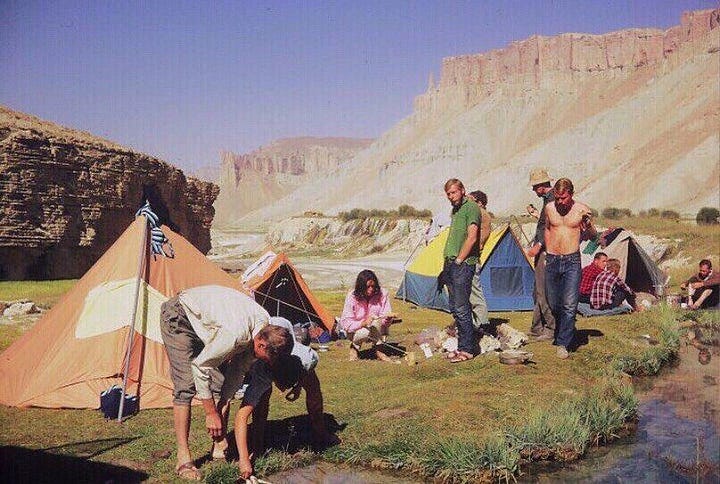
Many religious scholars would agree that a central element of mysticism is paradox, and at that, a paradox that guides the soul into a contemplative state where an experiential relationship with God can grow. The Eucharist is a fantastic example of a mystical paradox; on the one hand, the Host begins as mere bread — the fruit of field and oven; a simple wafer of wheat. Yet during the Transubstantiation of the Host, this humble sliver of wheaten bread becomes the Bread of Life — it becomes the literal flesh of Jesus Christ, it enters our own flesh and purifies our hearts, inuring us to the mysteries of faith, drawing us into the unity of the Holy Spirit. I know this because it has completely changed my life and leavened every dark spot in my heart; it has only been through the receipt of the Eucharist that I have been able to become truly repentant and to seek God in my daily life.
The mystical paradox of the Eucharist offers many opportunities for the rational mind to become distracted; “let us do a caloric analysis of the transubstantiated Host and we will find no protein — how then could it be His flesh!?” And yet the nature of paradox is not a test of rational principle but an invitation to shift epistemological gears; to allow our minds to contemplate a different structure by which knowledge can be obtained. If our hearts are opened and our own pride is dimmed by the graces of humility — we enter a metaphysical realm whereby our souls can be healed.
Logically, this ‘shifting of gears’ extends into realms outside the walls of the Church — we can find paradoxes at the center of our own hearts as well. In mine, there has always been a tension between two seemingly irreconcilable antipodes. On the one hand, I am the living fruit of the American nation — I am the Upstate man, the village-dweller and forest creature, the child raised on the banks of the old Black River Canal. On the other, I am the vagabond; the permanent stranger who walks the earth, at once meekly poor and somehow cosmopolitan, for I have seen and understood places and lives of men utterly far removed from my own home. The rational mind says I must “pick one” — that no resolution can be found between the two. Yet this tension is also an invitation to think beyond all rational schema one might employ to determine their path in this world; I can meditate upon these opposing poles and in so doing, be drawn into a mysticism about place.

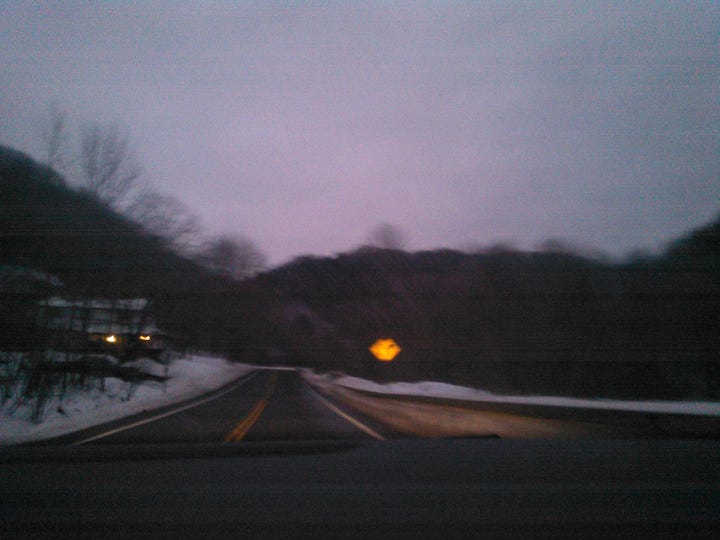
For the traveler knows place as intimately as the front-porch-sitter who hasn’t left his home county in decades. Because he is a permanent outsider, his perspective of the ‘still life’ of a given place is heightened; he only misses the dimensions of a place one finds solely in the passage of many seasons. In a sense, my own localist understanding of my home region was really borne of travel — it was in departing that I came to appreciate the place that made me who I am. And conversely, it is in returning home that I find a certain difficulty in integrating — there are constant reminders that I went too far for too long to expect a plain and painless transition into true yokeldom. A hunger exists in me as I remain at my estate, a hunger to travel. And in departing, a hunger for home rapidly emerges. I meditate on both as they visit me, and in so doing, meditate on holy things — on the path which the good Lord has expertly designed for me, and the manner in which I sleepily find and lose my way as I tread it.
My first post on this blog was titled Cast Down Thy Bucket, and the title of this blog is County Line Notes. Perhaps a little hamfisted — it was clear to me when I made this blog that I would be casting down my bucket at my little house on the County line. Now, as summer has worn on, I am not so sure. The summer has brought me to the end of my military contract, it has watched me fall in love with a woman far from here, and it has overseen the grievous drama surrounding my mother’s terminal illness. My path has been strange, and perhaps this strangeness will continue to reign — and I thank God for it as I unfurl old maps and dream again of striking out on new roads, that I may properly come home again.
In closing, I offer apologies to my subscribers for my long and unplanned absence, and commit to sharing every mile of the journey with you all here. Perhaps you will be surprised at the bounty of definitively localist perspectives that can be gained by indefinite low-budget travel. Thank you for your support, and keep your eyes peeled for new weekly installments as I set out on the road once again. God bless you.





I love this so much!!